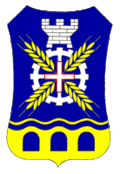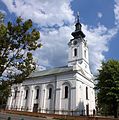Kula (Serbia)
|
Кула Kula |
||||
|
||||
| Basic data | ||||
|---|---|---|---|---|
| State : | Serbia | |||
| Province : | Vojvodina | |||
| Okrug : |
Zapadna Backa |
|||
| Coordinates : | 45 ° 36 ′ N , 19 ° 32 ′ E | |||
| Residents : | 26,867 (2011) | |||
| Telephone code : | (+381) 025 | |||
| Postal code : | 25230 | |||
| License plate : | SO | |||
| Structure and administration | ||||
| Mayor : | Lazar Greber | |||
| Website : | ||||
Kula ( Serbian - Cyrillic Кула , Hungarian Kúla , German Wolfsburg ) is a medium- sized town in the Okrug Zapadna Bačka Serbia with about 26,867 inhabitants. It is the administrative seat of the Opština Kula . The city lies on the Batschka Canal .
The Serbs make up the majority of the population in the city . There are also minorities such as Montenegrins , Russians and Hungarians . The German minority, which made up about a third of the population in the first half of the 20th century, was expelled at the end of World War II.
Sports
The football club called Hajduk Kula is based in Kula. This played in the super league , the top division of Serbian football.
Personalities
sons and daughters of the town
- Isidor Bajić (1878–1915), composer
- Dragan Škrbić (* 1968), Serbian-Spanish handball player
- Duško Grujić (* 1972), football player
Personalities related to the city
- Ljubomir Fejsa (* 1988), football player; played for FK Hajduk Kula (2006–2008)
Web links
Individual evidence
- ↑ Duško Grujić , worldfootball.net



